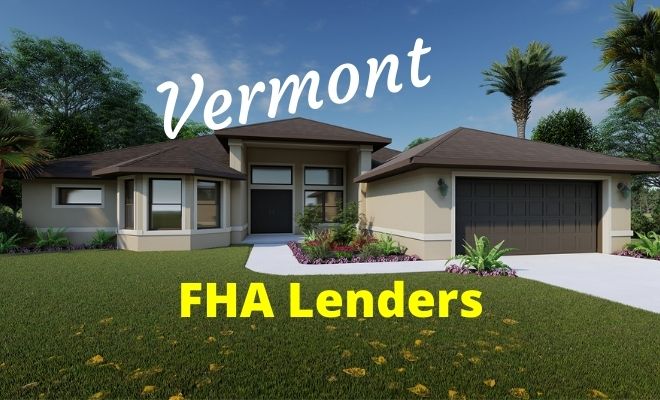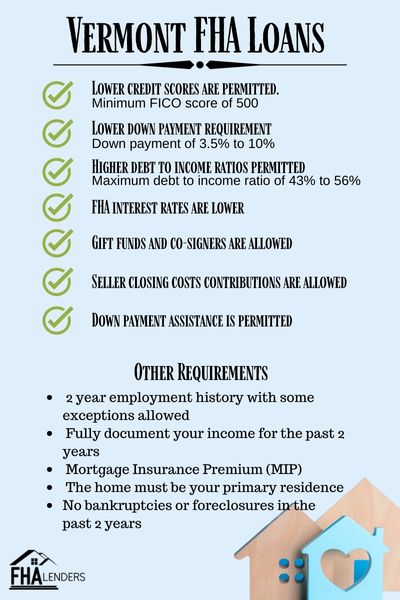Vermont FHA Loans – Requirements and Loan Limits for 2024

Vermont home buyers who need a small down payment or have poor credit scores may be able to purchase a home with an FHA home loan. There are many FHA lenders in Vermont who offer FHA loans, but not all of them participate in all of the various FHA loan programs options available.
The Vermont FHA loan program makes owning a home possible even for first-time buyers with less stellar credit scores. The basic requirements for obtaining an FHA loan include a minimum credit score of 580, a down payment as low as 3.5%, and proof of steady employment and income. Additionally, borrowers must meet debt-to-income ratio guidelines set by the Federal Housing Administration.
According to recent data from the U.S. Department of Housing and Urban Development (HUD), there were 1,200 FHA loans approved in Vermont in 2023, indicating a steady demand for FHA loans in this state.
For more than 20 years we have helped Vermont borrowers to finance their homes and to provide answers to their questions about FHA eligibility requirements. We will take you through the Vermont FHA loan eligibility requirements, detail what is needed to qualify, then help with your application.
If you already know that an FHA loan is right for you, then click to connect with a Vermont FHA lender whether you live in Burlington, Brattleboro, Essex, or anywhere else in the state.
FHA Loan Benefits in Vermont
These are the benefits of an FHA loan versus a conventional loan:
- Lower credit scores permitted
- Lower down payment requirement
- FHA interest rates are lower than conventional rates
- Gift funds are allowed
- Seller closing cost contributions are allowed up to 6% of the purchase price
- FHA loans are assumable
- Co-signers are allowed
- Higher debt to income ratios are permitted up to 56.9%
- Available in rural areas which is important when searching for homes in Vermont
According to the HUD FHA Handbook, FHA loans help home buyers by providing lenders with insurance against potential losses to allow homebuyers to qualify with a smaller down payments and lower credit scores.
Eric Jeanette – “FHA loans are perfect for first time home buyers who may have a small down payment or low credit scores.”
Types of FHA Loans in Vermont
There are various types of government backed FHA mortgages available in the state of Vermont for both purchases and also refinances. Each of these are for a specific situation that a home buyer or current homeowner may encounter. Although these programs are available, not every lender offers them and the ones who do may have their own unique requirements.
- Standard Purchase
- Standard Refinance
- FHA 203k Rehab (when buying or refinancing)
- FHA Streamline Refinance
- FHA One Time Close Construction Loan
- FHA Cash Out Refinance
- FHA Energy Efficient Mortgage
We will review some of these programs below and will provide additional eligibility information.
FHA Loan Requirements in Vermont for 2024
These are the basic FHA loan requirements for this year. All of these must be met to be approved for an FHA loan. If you are not positive on whether you meet these standards or have questions, an FHA lender can help.
- Down payment of 3.5% or 10% if your credit score is below 580
- 2-year employment history with some exceptions allowed
- Fully document your income for the past two years
- Minimum FICO score requirement of 500 – down payment will vary
- Mortgage Insurance Premium (MIP) is required for every FHA loan
- Maximum debt to income ratio of 43% with exceptions up to 56%
- The home must be your primary residence
- No bankruptcies or foreclosures in the past two years
Credit Score Requirements
For any loan, your credit score is a vital component in determining your eligibility and interest rate. FHA loans tend to be more flexible than other conventional loans when it comes to credit scores. While conventional loans may demand higher credit scores, FHA loans are more lenient, usually accepting scores as low as 580 but we allow scores down to 500.
It’s important to note that while this minimum credit score is set by FHA standards, individual lenders might require a higher score for their specific lending requirements. A higher credit score will typically lead to better loan terms, including a lower down payment. We can help you regardless of your credit score.
Maximum Debt-to-Income Ratio
FHA loans will allow for a higher debt to income ratio versus conventional loans. With good credit and steady income, you could get approved for an FHA loan with a DTI of up top 56.9%. This is the maximum allowable debt to income ratio for an FHA loan. We can help you if your DTI is too high and we recommend reading our article on the FHA debt to income ratio.
Down Payment for FHA Loans
The minimum down payment for an FHA loan in Vermont is 3.5% of the purchase price. If your credit scores are below 580, the down payment is 10%. Lenders cannot change the FHA down payment requirements. However, you can get help with the down payment.
You can receive down payment assistance which we cover below. A gift from a relative is permitted to help with the down payment and closing costs. Other than the USDA or VA loans, FHA has the lowest down payment.
Property Requirements: Ensuring Safety and Security
In addition to borrower qualifications, the property itself must meet certain safety, security, and structural standards set by the FHA. These requirements ensure the property is safe and habitable for its occupants.
Each property financed by an FHA loan will require a full FHA inspection. This is something you will need to pay for prior to closing. The inspection is extremely detailed and the home must pass the inspection to be financed with an FHA loan. If there are things that need to be repaired, those repairs must happen before closing.
Read more about the FHA inspection guidelines.

FHA Down Payment Assistance Programs in Vermont
There are various down payment assistance programs in every state. Below is a list of just a few down payment assistance programs that may be available to you in Vermont. Home buyers will need to contact, and arrange for these programs independently. Lenders will accept the funds from these programs for your down payment but they will not arrange for the down payment assistance.
Manufactured Housing Assistance
We also have the ability to offer lender provided down payment assistance. There will be minimum credit score requirements and the other will be included in the entire loan package offered by the lender. Contact us here if you are interested in this option.
Application Process and Required Documentation
The loan officer will provide you with a secure link to complete your loan application. It is important to complete the application fully as if it is incomplete, it will delay the process.
Next, your loan officer will pull your credit and the liabilities will be imported into the loan application.
Once you have fully completed the mortgage application, the loan officer or processor will ask you to upload the following documents through a secure portal:
- Last 30 days pay stubs
- Last two months bank statements
- Last two years tax returns
- Last two years W2s
- Copy of the sales contract for purchases
- Copy of your current mortgage statement for refinances
When you are farther into the application process, at some point you will be asked to provide a copy of your homeowner’s insurance policy reflecting the required coverage for the home.
After your loan application is completed and signed, you will receive the official disclosures including the loan estimate which would include the closing costs.
FHA Approved Loan Limits for Each County in Vermont
Every county in the United States has specific maximum loan limits that are set for single family homes, as well as 2-4 unit properties. The limits are set based upon the average home sales value in that county.
Keep in mind these are loan limits which means it is the most you can borrow in your county. However, you can purchase a more expensive home, but the difference between the purchase price and the maximum loan limit would have to be bridged by your down payment.
The FHA loan limits vary for each county and are set to meet the average median home cost in each area. This FHA Loan limit listing below will be kept updated so you may bookmark the page for future reference.
FHA 203k Loans in Vermont
FHA 203k loans are a great program which will allow you to borrow the money needed to purchase the home plus additional funds needed to rehabilitate or remodel the home. This program is also available in your state and we work with lenders that help with your FHA 203k loan.
If you would like to fully understand how this program works, we suggest reading our article on FHA 203k loans.
FHA Streamline Refinance in Vermont
The FHA streamline refinance program is available to existing homeowners who would like to refinance for a lower rate while eliminating some of the refinance costs such as an appraisal. You may also get a discount on the mortgage insurance premium which is another advantage.
For more information, please read our article on the FHA streamline refinance.
FHA Pre-Approval Process for Purchases or Refinances
If you are looking for an FHA loan, there is an optimal process you should follow to get pre-approved.
- The first step is to make sure you have the minimum down payment needed to qualify
- check your credit and try to cleanup anything that is pulling down your scores
- Get a copy of your tax returns for the past two years
- Get copies of your pay stubs for the past month
- Get copies of your last two months’ bank statements
- Speak to an FHA lender about your loan scenario
Speak to a lender early in the process because they can identify opportunities to help with your FHA approval. This should be done months before you start looking for a home. Read more about how to get pre-approved for an FHA loan.
What to Look for in an FHA Lender
We take a few things into consideration when looking at which lenders we work with. Some of these also may be, or should be very important to you as you continue shopping for an FHA loan.
A good FHA lender will:
- Allow for credit scores as low as 500
- Provide FHA 203k loans
- Offer competitive rates and fees
- Have a great processing and underwriting team
- Work closely with you throughout the loan process
- Communicate well and will provide you with updates along the way
Insurance
Interest
Insurance
Insurance
Amount
Amount
Insurance
Frequently Asked FHA Questions
Can I get an FHA loan with a bankruptcy?
In general, you will need to wait two years before applying for an FHA loan after a bankruptcy. However, there are some exceptions which may allow you to apply sooner. Read our article on the bankruptcy waiting period.
Are all FHA lenders the same?
Not all mortgage lenders who offer FHA loans are the same. They all do not offer all of the FHA programs and their rates and fees may also vary. Most importantly, the individuals who help to process and underwrite your loan will have a huge impact on your FHA loan experience.
Can I use gift funds for an FHA loan?
FHA loans do allow for gift funds to cover your down payment as well as your closing costs. The gift funds must come from a relative or a close friend as approved by the lender. You will need to provide the lender with a gift letter that is signed by the donor.
Do I need an appraisal for an FHA loan?
The FHA does require an appraisal and inspection before your loan can be approved. The FHA inspection has clear guidelines on what needs to be repaired before your loan can close. They want to make sure home buyers are moving into a home that is safe and operational.
Can I get an FHA loan for an investment property?
FHA loans are for primary residences only and if your goal is to purchase an investment property, you cannot use FHA insured financing for that purchase. However, if you are currently living in a home that is financed with an FHA loan, you can move to a new home and keep the current home as an investment.
Are there any income limits in Vermont for an FHA loan?
FHA guidelines do not have income limits which means you can be a high income earner and still get approved for an FHA loan.
Do I need mortgage insurance for an FHA loan?
Every FHA loan requires mortgage insurance. You will have an upfront mortgage insurance premium and also a monthly premium that is included in your total mortgage payment. Read more about the FHA mortgage insurance requirements.
How long does it take to get approved?
You can secure an initial approval from the automated underwriting system just minutes after completing your loan application. The final approval would come after all of the underwriter’s conditions have been cleared. Some examples of conditions are an appraisal, a verification of employment, or copies of asset statements that may be missing.
What are the interest rates for FHA loans in Vermont?
Interest rates for FHA loans are slightly lower than conventional loans at the moment. To get the best possible rate, it is important to have excellent credit scores.
Can you use a Vermont FHA loan to purchase a property that needs renovations or repairs?
You can use a Vermont FHA loan to purchase a property that needs renovations or repairs. The FHA 203(k) loan program allows borrowers to finance both the purchase price of the property and the cost of renovations into one loan. This is particularly advantageous for first-time homebuyers who may not have significant savings for repairs. In 2023, over 21% of FHA loans were used for properties that needed rehabilitation, showcasing the popularity and accessibility of this option for buyers in need of renovation financing.
How do Vermont FHA loans differ from conventional loans?
Vermont FHA loans differ from conventional loans in several ways. Firstly, FHA loans are backed by the Federal Housing Administration, which means they have more flexible qualification criteria and allow for lower down payments (as low as 3.5%). In contrast, conventional loans often require higher credit scores and larger down payments. Read more about FHA vs conventional loans.
Are there any income limitations for qualifying for a Vermont FHA loan?
There are no income limits or maximum income criteria for FHA loans like you will find with a USDA loan. You can make a million dollars per year and still qualify for an FHA loan. Meanwhile, there are minimum income requirements which are driven by the FHA debt to income ratio guidelines. This calculation will let you know how much you are permitted to borrow with an FHA loan.
Are there any specific property or appraisal requirements for obtaining a Vermont FHA loan?
There are specific property and appraisal requirements for obtaining a Vermont FHA loan. The property must meet certain minimum standards set by the Federal Housing Administration (FHA), such as being in good condition with no major structural issues. Additionally, an FHA-approved appraiser must assess the property to determine its value and ensure it meets the FHA’s guidelines. These requirements help protect both the borrower and the lender, ensuring that the property is a sound investment.
Vermont Home Buying Statistics
If you are thinking about buying a home in Vermont, these home buying statistics may be interesting and relevant to you.
Population = 647,064
Number of Housing Units = 339,034
Percent of Housing Units that are Owner Occupied = 72.1%
Average Home Value = $265,600
Average Mortgage Payment = $1,965
Average commute time to work = 23.3 minutes
Top Vermont Cities by Population
Burlington – 44,595
Essex – 22,408
South Burlington – 20,624
Colchester – 17,604
Rutland – 15,695
Bennington – 15,312
Brattleboro – 12,106
*References (US Census – Vermont Demographics)

For consumers – The Vermont Department of Financial Regulation helps to make to promote a stable banking industry in the state of Vermont while helping consumers to have safe and responsible access to financial services – Address: 89 Main Street • Montpelier, VT 05620-3101